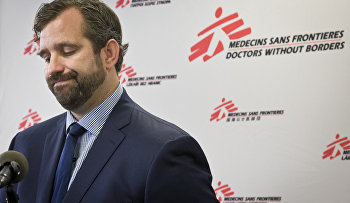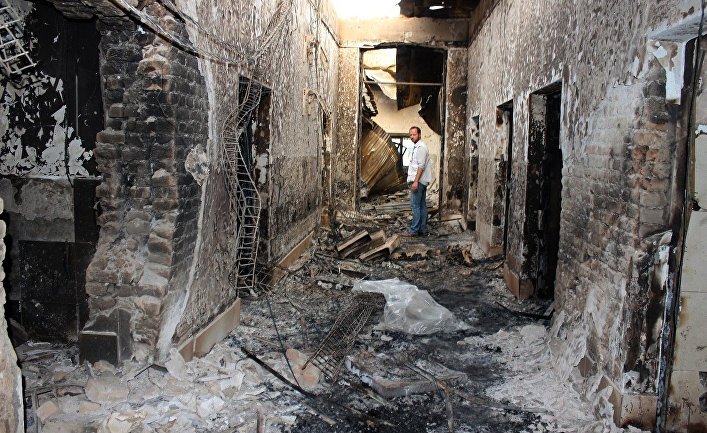The Russian Foreign Ministry joined voices with critics of the US Air Force bombing raid on the Afghan site of Kunduz. The US strafing of a hospital being run by the international humanitarian organization 'Médecins Sans Frontières” (Doctors Without Borders) killed 22 people — and was labelled “a flagrant breach of international law”. Meanwhile US Brigadier-General Richard Kim – who heads the investigation into the causes of the October 3 tragedy – said that the attack was made at the request of the Afghan military, who were coming under fire from Taliban militants. Kommersant has heard that the incident and its aftermath may well be discussed by NATO-nation defense ministers at their meeting in Brussels.
The statement that the US Air Force strike on the Kunduz hospital was “a flagrant breach of international law” was made on behalf of the Russian Foreign Ministry by official speaker Maria Zakharova. She went on to stress that “the attack took place despite the provision by international coalition forces of exact map coordinates of the hospital – provided precisely to avoid this kind of incident”. “This is not the first occasion on which civilians have been killed in Afghanistan by the indiscriminate use of American firepower,” Zakharova continued.
Why bombing the #Kunduz hospital was probably a war crime: http://t.co/QJtXr9z1ua pic.twitter.com/WU5spVQjFT
— The Intercept (@the_intercept) October 6, 2015
Criticism aimed at Washington was voiced by Alexei Pushkov, Head of the State Committee for Foreign Affairs. “While the US is pointing its finger at Russia — which is bombing militants in Syria – over claims of “random attacks”, the very same US has blown a “Doctors Without Borders” hospital in Afghanistan to the ground,” Pushkov wrote in his Twitter page.
The backstory is that Kunduz, a town in northern Afghanistan, came under Taliban control on 28 September. Afghan government forces, backed up by USAF air support, soon mounted a large take-back operation to free the town. On the morning of October 3 a US air strike on Kunduz destroyed the “Doctors Without Borders” hospital there – the best-equipped medical facility in north-eastern Afghanistan. At the time the air raid began, 105 patients and 80 medical staff were in the building. Twenty-two people were killed outright, and forty more were injured.
If the #Kunduz hospital airstrike was an "accident," why is the U.S. refusing an #IndependentInvestigation? http://t.co/6cQuHcFlio
— The Intercept (@the_intercept) October 7, 2015
The attack brought forth a maelstrom of criticism from human rights movements, and from leaders of many countries and organizations. Zeid Ra'ad al-Hussein, the UN High Commissioner for Human Rights called the incident “bitterly tragic, indefensible, and most probably criminal”. He went to say that if it becomes clear that the strike on the hospital was intentional, it would constitute a war crime by the USAF. Bernard Kouchner – a former French FM, and one of the founders of “Doctors Without Borders” – echoed these remarks in the Italian newspaper La Repubblica. The Italian Foreign Minister, Paolo Gentiloni, called the attack “a tragic mistake, for which there can be no justification”.
The World Health Organization had issued a warning on the day before the incident, saying that shelling the hospital in Kunduz would jeopardize the humanitarian relief program in Afghanistan. Despite this, neither “Doctors Without Borders” nor the International Red Cross Committee has made any announcement of a cessation of activities in the conflict-stricken regions of the country.

Washington begged onlookers not to jump to unwarranted conclusions regarding the causes of the incident until their full Inquiry is completed – an Inquiry conducted by US authorities, with NATO and Afghan input. Despite this, US Brigadier General Richard Kim – heading the investigation, and in Kunduz himself – shared some details of what had happened. He said that the air strike on the hospital was undertaken at the request of the Afghan military, who had come under enemy fire. This version of events is backed up by Kunduz provincial governor Hamdulla Danishi, who stated that “100% of the hospital facilities had been taken over by the Taliban. The hospital has extensive gardens, where the Taliban were placed. We suffered fire from them for some time…”
NATO assured that “preliminary multinational investigations” into the cause of the tragedy would be “completed within the next few days”. It's quite possible that the results of such investigations would be available by the NATO-nations Defense-Minister conference — due to be held in Brussels on 8 October. A NATO-HQ source close to Kommersant magazine said that the topic of the Kunduz hospital bombing may crop up during sideline meetings at the conference — by way of trying to prevent recurrences.
We demand answers for the senseless deaths of our patients & colleagues in #Kunduz #IndependentInvestigation pic.twitter.com/4wzc0rMFo5
— MSF International (@MSF) October 8, 2015
“Doctors Without Borders” has already issued a statement saying the the results of the investigations could pan-out very seriously for them. Christopher Stokes, the General Director of DWB, has said that there had been no militants in the vicinity of the hospital — and that claims of shelling coming from the hospital needed to be investigated not by the coalition of peacekeepers in Afghanistan, but by independent military experts. Neither Washington nor Kabul have made any comment on this suggestion.






